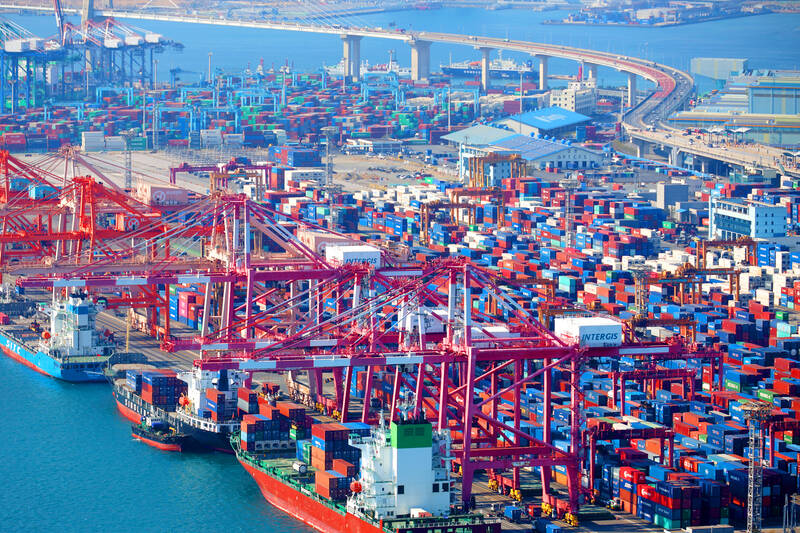South Korea replaced Japan as the largest trade deficit country for Taiwan in the first 10 months of this year, with Seoul the main supplier of electronic components to Taipei’s artificial intelligence (AI) developers, the Ministry of Finance said on Thursday last week.
During the January-to-October period, Taiwan’s trade deficit with South Korea rose to US$18.1 billion, surpassing the US$10.2 billion deficit for all of last year and topping the US$16.7 billion deficit with Japan, the ministry said.
The ministry said the deficit with South Korea has been rising because the country supplies a large volume of DRAM chips to Taiwan’s AI-related goods producers, while Taiwan and South Korea are close partners in the global supply chain, it added.

Photo: EPA-EFE / YONHAP
Recently, South Korea-based SK Hynix Inc, the second-largest DRAM brand in the world, said it would work with Taiwan Semiconductor Manufacturing Co (台積電) to develop the next generation of high bandwidth memory chips, with both companies supplying US-based AI chip designer Nvidia Corp.
ICs were the largest category of exports from South Korea to Taiwan in the 10-month period, with a value of US$23.6 billion, ahead of oil refinery items at US$1.1 billion, cyclic hydrocarbon at US$900 million, computer components at US$900 million and semiconductor production equipment at US$600 million, the ministry said.
Over the period, ICs were the largest source of Taiwan’s trade deficit with South Korea with a value of US$12.9 billion, accounting for about 71.3 percent of Taiwan’s total trade deficit ahead of oil refinery items at US$800 million and computer components at US$700 million, it said.
Taiwan sold US$16.8 billion of goods to South Korea in the 10 month period and bought US$34.9 billion worth of South Korean-made merchandise.
South Korea was the fifth-largest export market for Taiwan, trailing China and Hong Kong, the US, Japan, and Singapore, but the fourth-largest supplier to Taiwan following China and Hong Kong, the US, and Japan.

The New Taiwan dollar is on the verge of overtaking the yuan as Asia’s best carry-trade target given its lower risk of interest-rate and currency volatility. A strategy of borrowing the New Taiwan dollar to invest in higher-yielding alternatives has generated the second-highest return over the past month among Asian currencies behind the yuan, based on the Sharpe ratio that measures risk-adjusted relative returns. The New Taiwan dollar may soon replace its Chinese peer as the region’s favored carry trade tool, analysts say, citing Beijing’s efforts to support the yuan that can create wild swings in borrowing costs. In contrast,

Nvidia Corp’s demand for advanced packaging from Taiwan Semiconductor Manufacturing Co (TSMC, 台積電) remains strong though the kind of technology it needs is changing, Nvidia CEO Jensen Huang (黃仁勳) said yesterday, after he was asked whether the company was cutting orders. Nvidia’s most advanced artificial intelligence (AI) chip, Blackwell, consists of multiple chips glued together using a complex chip-on-wafer-on-substrate (CoWoS) advanced packaging technology offered by TSMC, Nvidia’s main contract chipmaker. “As we move into Blackwell, we will use largely CoWoS-L. Of course, we’re still manufacturing Hopper, and Hopper will use CowoS-S. We will also transition the CoWoS-S capacity to CoWos-L,” Huang said

Nvidia Corp CEO Jensen Huang (黃仁勳) is expected to miss the inauguration of US president-elect Donald Trump on Monday, bucking a trend among high-profile US technology leaders. Huang is visiting East Asia this week, as he typically does around the time of the Lunar New Year, a person familiar with the situation said. He has never previously attended a US presidential inauguration, said the person, who asked not to be identified, because the plans have not been announced. That makes Nvidia an exception among the most valuable technology companies, most of which are sending cofounders or CEOs to the event. That includes

INDUSTRY LEADER: TSMC aims to continue outperforming the industry’s growth and makes 2025 another strong growth year, chairman and CEO C.C. Wei says Taiwan Semiconductor Manufacturing Co (TSMC, 台積電), a major chip supplier to Nvidia Corp and Apple Inc, yesterday said it aims to grow revenue by about 25 percent this year, driven by robust demand for artificial intelligence (AI) chips. That means TSMC would continue to outpace the foundry industry’s 10 percent annual growth this year based on the chipmaker’s estimate. The chipmaker expects revenue from AI-related chips to double this year, extending a three-fold increase last year. The growth would quicken over the next five years at a compound annual growth rate of 45 percent, fueled by strong demand for the high-performance computing